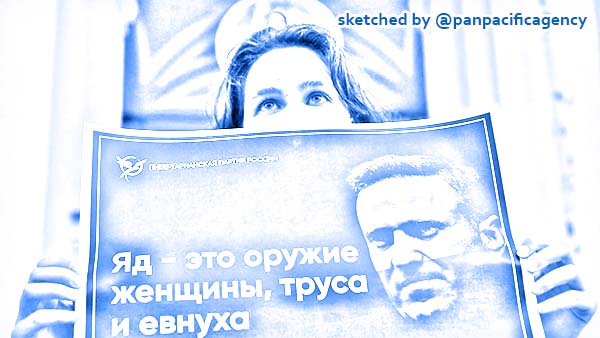Western outrage after Putin critic Navalny ‘poisoned with Novichok’, deadly Soviet-era nerve agent

A protester stands holds a poster reads "poison is the weapon of a woman, a coward and a eunuch!" during a picket in support of Russian opposition leader Alexei Navalny in the center of St. Petersburg, Russia, Thursday, Aug. 20, 2020. (AP Photo/Elena Ignatyeva). Sketched by the Pan Pacific Agency.
BERLIN, Sep 3, 2020, AP, AFP, Reuters. Western leaders have demanded an explanation from Moscow after the German government said Russian opposition leader Alexei Navalny was poisoned with the same type of Soviet-era nerve agent used in a 2018 attack on a former Russian spy, South China Morning Post reported.
“It is certain that Alexei Navalny is the victim of a crime,” German Chancellor Angela Merkel said on Wednesday.
“He was meant to be silenced and I condemn this in the strongest possible terms, on behalf of the German government.”
Navalny, 44-year-old politician and corruption investigator, fell ill on a flight to Moscow on August 20 and was taken to a hospital in the Siberian city of Omsk after the plane made an emergency landing.
He was moved two days later to Berlin’s Charite hospital, where doctors last week said initial tests indicated Navalny had been poisoned.
He has been one of the fiercest opponents of Russian President Vladimir Putin during the past decade.
A German government spokesperson had confirmed that there was “unequivocal” evidence Navalny was poisoned with a chemical nerve agent from the Novichok group. This was the finding of a toxicology test carried out in a special laboratory of Germany’s military.
The findings – which experts say point strongly to Russian state involvement – added to tensions between Russia and the West.
The Berlin hospital treating the dissident said he remains on a ventilator though his condition is improving. It said it expects a long recovery and still can’t rule out long-term effects on his health from the poisoning.
British authorities identified Novichok as the poison used on former spy Sergei Skripal and his daughter in England in 2018.
Britain charged two Russians – alleged to be agents of the Russian military intelligence service GRU – in absentia with that attack that left the Skripals in critical condition and killed a British woman. Russia has refused to extradite the men to the UK.
The United Kingdom and Italy also called on Russia to explain what happened to Navalny, with British Prime Minister Boris Johnson calling the use of a chemical weapon “outrageous”. In Washington, National Security Council spokesman John Ullyot tweeted that it was “completely reprehensible”.
“We will work with allies and the international community to hold those in Russia accountable, wherever the evidence leads,” Ullyot said.
German Foreign Minister Heiko Maas said the Russian ambassador was summoned to his ministry Wednesday after the latest findings.
Russia’s deputy UN ambassador, Dmitry Polyansky, dismissed the finger pointing as a knee-jerk reaction. “Today accusing #Russia is a must-do for any Western country,” he said in a tweet.
In Moscow, Russian authorities were quick to blame Germany for not sharing its findings.
Kremlin spokesman Dmitry Peskov said Russian authorities were “ready and interested in full cooperation and exchange of information” with Germany but added that Berlin still hasn’t provided any official response to formal requests from the Russian prosecutor general’s office and doctors who treated Navalny.
Peskov reiterated that Russian doctors didn’t find any poisonous substances in Navalny’s system. Russian Foreign Ministry spokeswoman Maria Zakharova charged on state TV that Germany preferred “public statements without providing any facts whatsoever” to “a thorough investigation”.
The German government said it would tell its partners in the European Union and Nato about the test results and would consult them on a response. Germany also will contact the Organisation for the Prohibition of Chemical Weapons.
Novichok is a class of military-grade nerve agents developed by the Soviet Union at the end of the Cold War. Western weapons experts believe it was only ever manufactured in Russia.
Russia has said the development of Novichok was halted by 1992, a year after the break-up of the Soviet Union.
In 1997, Moscow joined the Chemical Weapons Convention, which last year put Novichok on its list of controlled substances, in effect banning it.
It can be deployed in an ultrafine powder, liquid or vapour. Early signs of exposure to Novichok include constricted pupils and ringing ears, followed by convulsions, vomiting and difficulty breathing as the lungs fill with fluid. It can be treated with antidotes including atropine, which impede its course but cannot fully counter the effects.
Andrea Sella, a professor of inorganic chemistry at University College London, said Navalny’s prognosis was hard to predict. He said that “very swift action” was needed to stabilise patients in poisoning cases and noted the “significant delay”, given that Navalny was initially cared for by Russian doctors who said they had ruled out poisoning.
“The problem is that even if Mr Navalny were to survive there may be lingering long-term neurological issues,” Sella said.
Navalny’s allies have also accused Russian authorities of delaying his transfer out of the country after the poisoning. It took much wrangling and 48 hours to move Navalny to Berlin. Local doctors at the time said he was too unstable to be transported, and the Kremlin said it would defer to the physicians.
The Siberian medical team relented only after a charity that had organised a medevac plane revealed that German doctors who examined the politician said he was stable enough to be moved.
The reversal came as international pressure on Moscow mounted substantially.